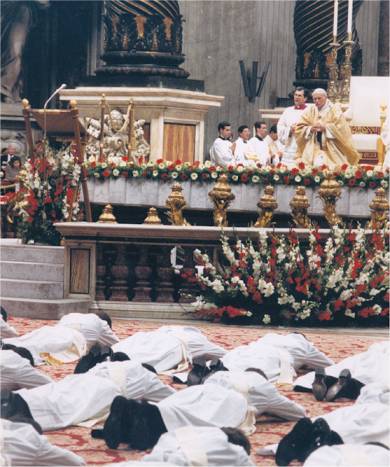Dr. Chris Burgwald, STD, has a fascinating essay on 'Priestly Identity and Mission in the Theology of Pope Benedict XVI' over at Ignatius Insight.
Check it out here.
(11 printed pages, good read over lunch?)
Intro:
As this Year for Priests draws to a close it seems appropriate to look again at the theology of the priesthood in the work of our Holy Father, Pope Benedict. In this essay I intend to examine what Pope Benedict has said and written about the identity and mission of the Catholic priest. My source material covers both papal documents and his personal, non-Magisterial remarks, as well as some of his personal theological work prior to his election as pope. In particular, I focus on his essays on the priesthood in the works Called to Communion (CC) and Pilgrim Fellowship of Faith (PFF), as well as some relevant comments from the first volume of Jesus of Nazareth (JN). In terms of his official, pontifical remarks on the issue, I've naturally looked to the homilies, addresses and letters pertaining to this Year for Priests as well as his homilies from the Chrism Masses during his pontificate.
The title of this essay comes from the Holy Father's letter last June proclaiming this Year for Priests, as well as from his homily on the Solemnity of the Sacred Heart which inaugurated this Year. He concluded the letter this way: "Dear priests, Christ is counting on you. In the footsteps of the Curé of Ars, let yourselves be enthralled by him. In this way you too will be, for the world in our time, heralds of hope, reconciliation and peace!" In this short passage, it seems to me that we find many of the central themes of Pope Benedict's theology of the priesthood, and it it to that theology that we will now turn.
The outline for this presentation is as follows: I'll begin with Benedict's analysis of the historical context: the post-conciliar crisis in the priesthood. Following that, we'll focus in on a central theme in his vision of priestly identity and mission: the Christological roots and foundation of both. I'll conclude by examining what Benedict calls the "spiritual applications" of these theological considerations.
Monday, June 14, 2010
Subscribe to:
Post Comments (Atom)










No comments:
Post a Comment